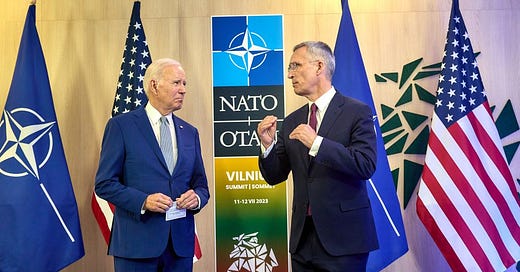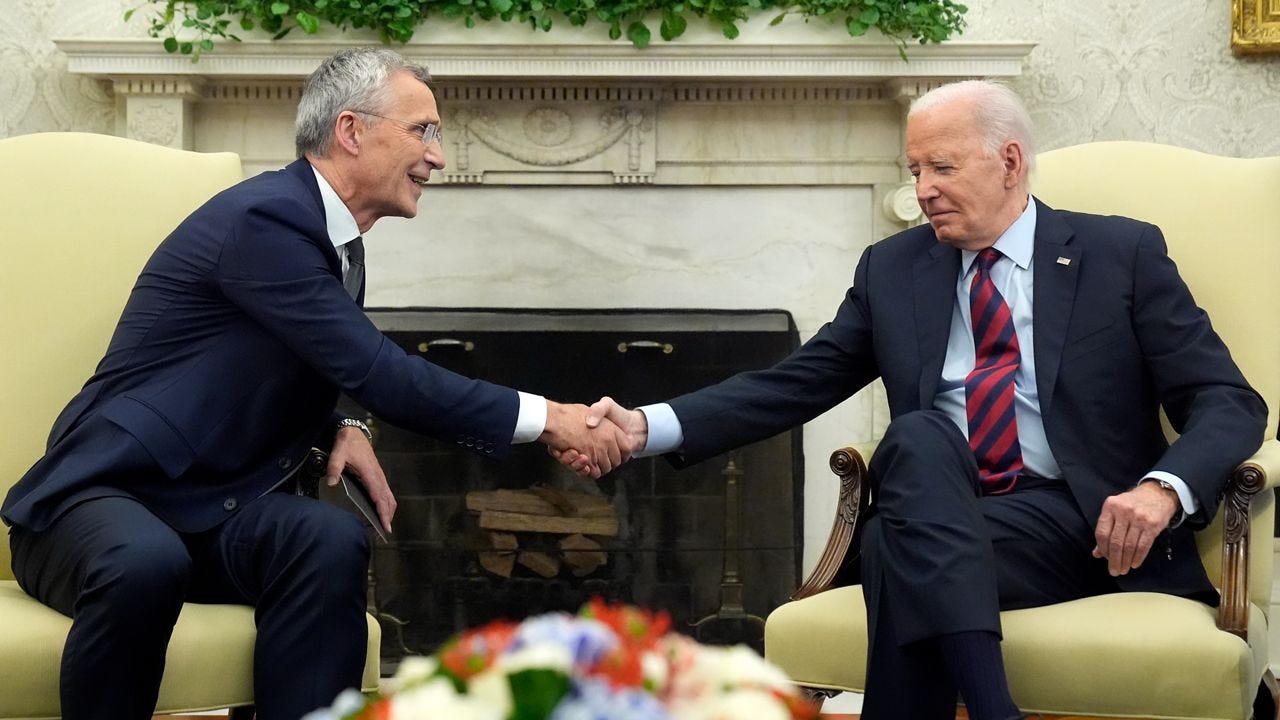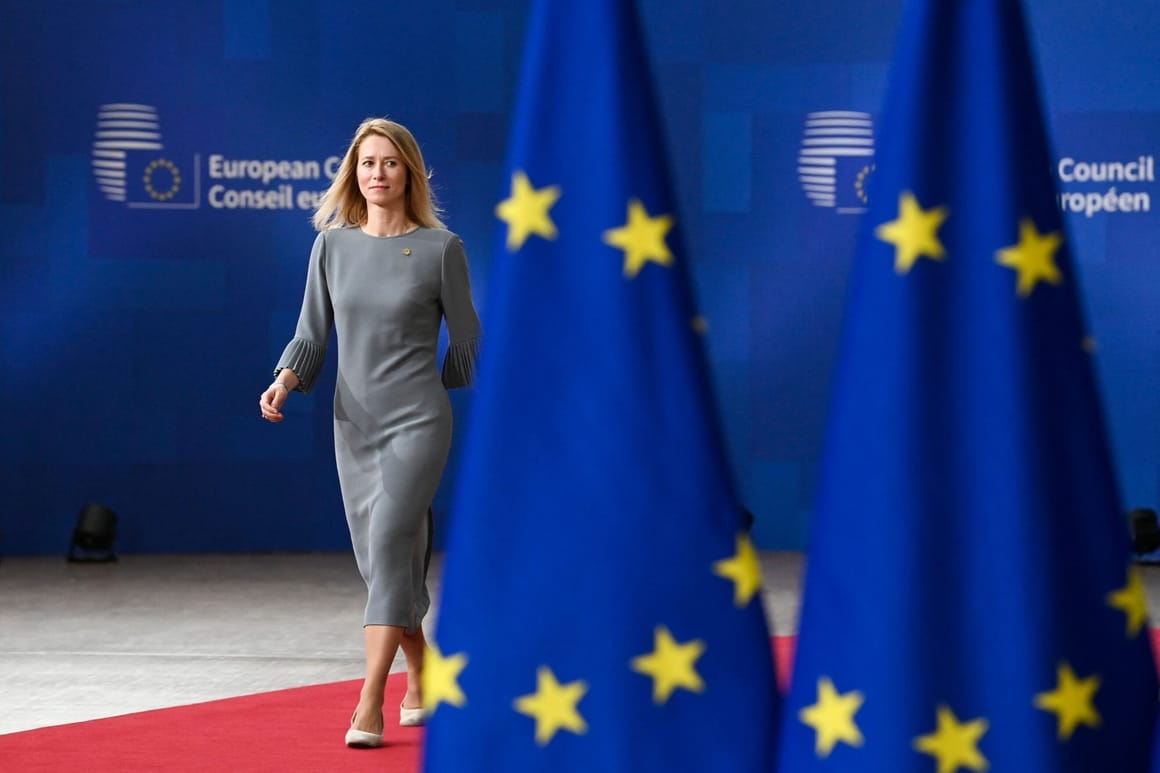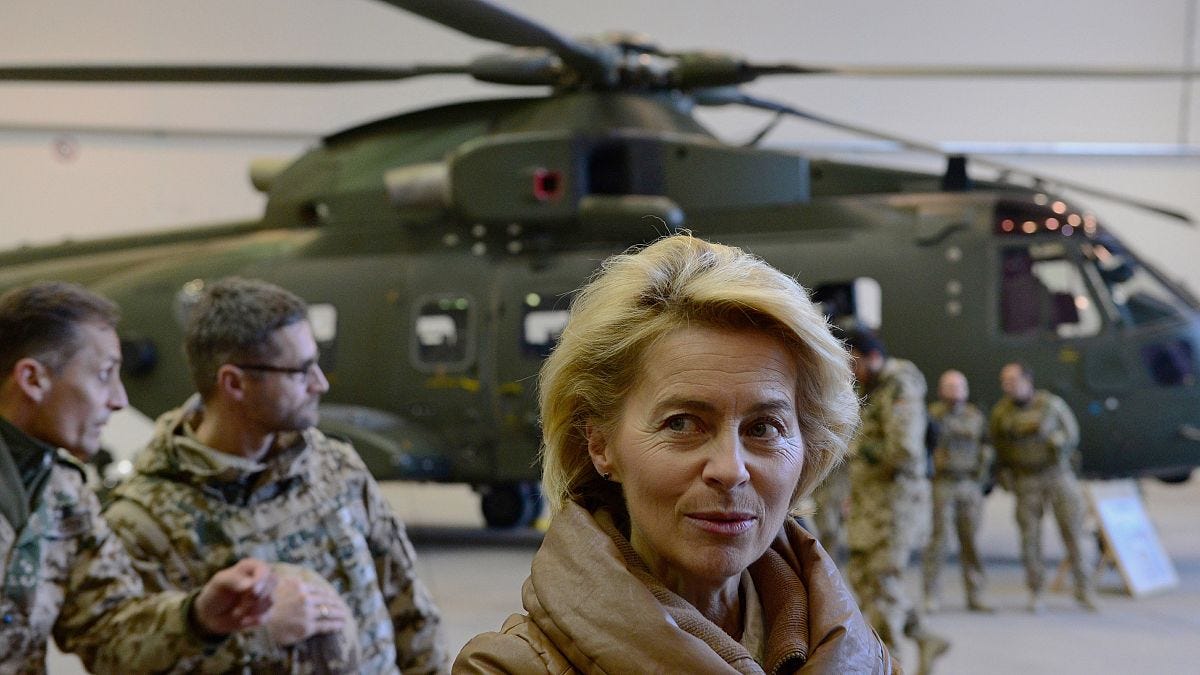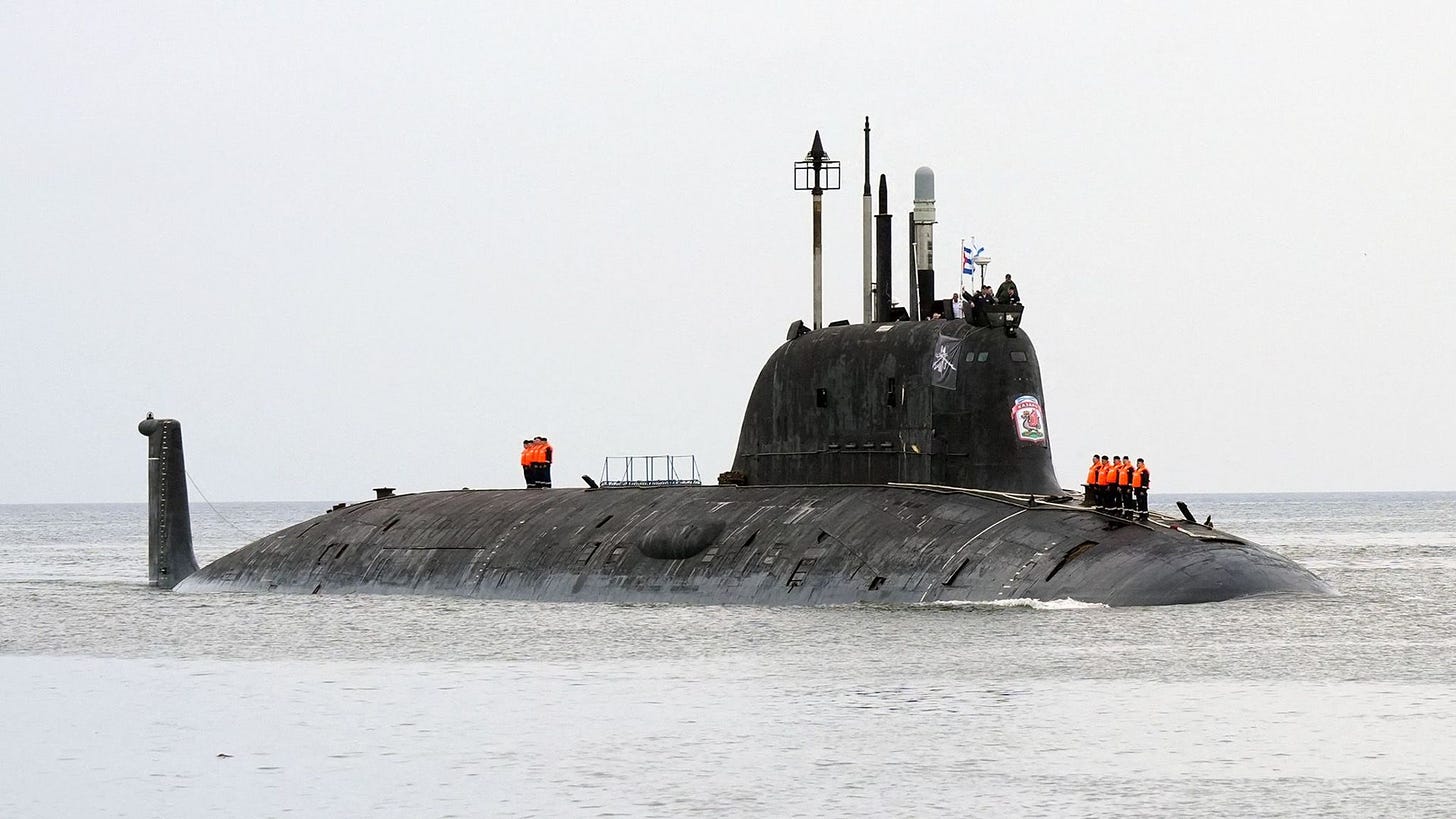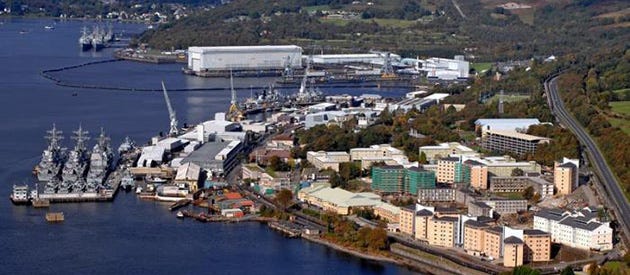NATO and European defence: three stories
Some items which have bobbed briefly to the surface of the media in the past few days, on NATO spending, the future of European defence and Russian power
A few things caught my eye over the last few days but none initially seemed able to carry a full essay, so I thought I’d put them all together as they’re all more or less loosely linked under the umbrella of NATO capabilities, threats and readiness. I propose no closer linkage than that, necessarily, but everything is related in the end.
NATO defence spending
A story in Politico drew attention to a NATO press release which revealed an expectation that 23 member states would spend at least two per cent of their gross domestic product (GDP) on defence in 2024. This is unquestionably a welcome development: there is an agreement in the alliance that member states should spend a minimum of two per cent of GDP to maintain a credible potential military capability. It is especially welcome that five members—Poland, Estonia, the United States, Latvia and Greece—are expected to spend in excess of three per cent.
The announcement is also good news because it indicates that NATO members understand the volatility of the current international situation and are increasing their military spending accordingly. As recently as last year, only 11 member states were achieving the two per cent target, while in 2014 it was just three. So progress has been swift and substantial.
There are still some unsatisfactory aspects of this situation, however. The first is how long it has taken to get here. The idea of a benchmark of two per cent was initially agreed by NATO defence ministers in 2006, the purpose being:
to continue to ensure the Alliance’s military readiness… [and] serve as an indicator of a country’s political will to contribute to NATO’s common defence efforts, since the defence capacity of each member has an impact on the overall perception of the Alliance’s credibility as a politico-military organisation.
At the Wales Summit in 2014, it was again agreed that this should be a minimum level of spending on defence, emphasising that member states which had decreased their defence budgets, especially in the wake of the global financial crisis of 2007-08, should arrest and reverse that decline.
It has, moreover, taken the alliance 18 years to get to this situation, and it is one in which still only two-thirds of its members are meeting a minimum-spend commitment. This is not just a matter of increasing NATO’s military capabilities but of basic fairness: the alliance is founded on mutual self-defence, and essentially those countries not meeting their obligations and enjoying membership of a club but refusing to pay the full fees. There must be intense scrutiny and pressure on those who are still not pulling their weight: Croatia, Portugal, Italy, Canada, Belgium, Luxembourg, Slovenia and Spain.
(Iceland is also a member of NATO but has no armed forces: it has a coast guard which maintains an air defence system, and a small paramilitary Iceland Crisis Response Unit, but is otherwise demilitarised, and lacks even a constitutional mechanism for declaring war. It hosted US military units from 1951 to 2006.)
As everyone knows, the issue of contributions across NATO, what is known as “burden sharing”, is acutely important at the moment. Donald Trump, who still has a good chance of returning to the US presidency at November’s election, is a long-standing sceptic of NATO, and sees the alliance as an arrangement in which America is being cheated by European countries who refuse to “pay their way”. There are many flaws in Trump’s conception of NATO, and it is never easy to know what he will do next—not least because he often does not know himself—but we can be assured that NATO needs to meet its minimum spending commitment across the board as soon as possible, either as a gesture to persuade Trump that the United States’s partners are doing their bit, or to counterbalance a potential diminution of American commitment to NATO operations and European defence.
This is one of the reasons, though not the only one, that I am disappointed by the near-certainty that NATO will choose the outgoing prime minister of the Netherlands, Mark Rutte, as its next secretary general, to take office on 1 October. He has been the head of the Dutch government since October 2010, and it is only this year, as he is departing (he announced his intention to resign in July 2023), that the Netherlands will finally meet the two per cent target. It will do so barely, with and expected spending level of 2.05 per cent, the country’s highest since 1993. This hardly gives Rutte enormous moral authority to crack the financial whip on the remaining countries who are failing to meet their obligations.
All things considered, it is good that 23 NATO member states will meet the two per cent target this year, even if only just in a number of cases. But the predominant sentiment should be relief rather than celebration: we have got here at last but we are late and there are still stragglers. Stoltenberg said on Monday, during a visit to Washington, that this “demonstrate[s] that European Allies and Canada are really stepping up and taking their share of the common responsibility to protect all of us in the NATO Alliance”. Well, up to a point. There is still a great deal of work to do.
The European Union’s defence capacity
After the elections for the European Parliament earlier this month, attention has turned to selecting new leaders for the EU’s bureaucracy in Brussels: the president and members of the European Commission; the president of the European Council; and the president of the European Parliament. It had been hoped that informal agreement could be reached on these posts, and that of the high representative of the Union for foreign affairs and security policy, at a meeting of the EU’s 27 heads of state and government in Brussels on Monday, but this proved impossible. They will meet again on 27-28 June.
Although the European Parliament must formally confirm these positions, and no-one can be wholly certain how the new political complexion of the assembly will manifest itself, most of the negotiating will be done beforehand. Roberta Metsola, from the Partit Nazzjonalista in Malta, part of the European People’s Party, is almost certain to be re-elected as president of the European Parliament. The current president of the Commission, Germany’s Ursula von der Leyen, is seeking a second five-year term: she is also likely to be successful, but there are various potential obstacles in her way. The role of European Council president is thought to be going to Portuguese socialist former prime minister António Costa.
From a defence point of view there are two important points here, both relating to the composition of the European Commission. The first is the identity of the high representative for foreign affairs (who is also ex officio a vice-president of the commission). The outgoing office-holder is Josep Borrell, a Spanish former foreign minister who recently turned 77. His successor is likely to be the current prime minister of Estonia, Kaja Kallas, a member of the Estonian Reform Party which sits in the liberal Renew Europe group in the European Parliament. The group suffered some losses in the recent elections but is still just the third-largest bloc.
Kallas is an able and fluent politician, and had been touted as a possible successor to Jens Stoltenberg as secretary general of NATO. I have said before that I think she would have been an excellent choice for the role, and far preferable to the almost-inevitable Rutte. She made it clear she was interested in the position, but some within the alliance felt that her hawkish stance on Russia made her unsuitable as NATO’s next chief, and in April she backed Rutte’s candidacy. This is unfortunate, and cowardly: Kallas understands the threat which Russia poses, as her country borders Russia, and her mother, grandmother and great-grandmother were deported to Siberia in 1941 and detained for 10 years. Vladimir Putin’s government also put her on a wanted list in February on the grounds that she had allegedly sought to remove Soviet-era monuments to the Second World War in Estonia. Her impressively and calmly defiant response was “This is meant to make me afraid, the only response is that we shouldn’t be”. If she is chosen for the EU foreign affairs role, she will do it well.
When the full 27-member European Commission is chosen, it will for the first time probably include a dedicated defence portfolio, an innovation proposed by von der Leyen in February. However, its formal powers are likely to be very modest in comparison with other commissioners. The high representative generally chairs the EU’s Foreign Affairs Council and has responsibility for the Common Security and Defence Policy, which includes Permanent Structured Cooperation and the Military Planning and Conduct Capability. There are other competencies at an EU level: the organisation recently unveiled a defence industrial strategy, which engages some of the responsibilities currently held by the commissioner for the internal market; also in the internal market portfolio is the Action Plan on Military Mobility, although some aspects of that fall under the transport commissioner. Nevertheless, it is a long-standing and deeply embedded principle of the EU that security and defence policy is primarily conducted by member states.
On the assumption that von der Leyen does not seek formal treaty changes to the responsibilities of the high representative, the new defence commissioner will therefore have a slender portfolio of concrete powers. Politico warned recently that the role could be “reduced to coordinating meetings based on diplomatic goodwill, and could easily be overruled by a country with a big military industry like France”. That realisation is not uncommon. The impressive and admired Polish foreign minister, Radosław Sikorski, has ruled himself out of contention for a job that “does not exist in the EU”, while another name mentioned has been Gabrielius Landsbergis, the young foreign minister of Lithuania. Another rumour suggests the Italian prime minister, Giorgia Meloni, wants to install the current director of the Department of Information for Security, Elisabetta Belloni, or Roberto Cingolani, currently CEO of defence conglomerate Leonardo.
The signs are that the defence commissioner’s role is not being keenly sought and will be of limited influence. Personally, I regard that as a good outcome: I’ve always opposed the EU pushing its competences into the area of defence, not least because it will almost certainly come into conflict with NATO. Of the EU’s 27 member states, only four—Austria, Cyprus, Ireland and Malta—are not also in NATO, and these are, to be charitable, small nations. The overwhelming majority of the EU population is served by the alliance, and it is the best mechanism for common defence and security policy. I have been critical of the new EU common defence industrial strategy, not just because it is weak and potentially ineffective, though it is, but also because it will exacerbate divisions between NATO members who are also in the EU, and those who are not. When those outside include the United States and the United Kingdom, in defence industrial terms this seems deeply unwise.
It may be that von der Leyen decides not to press ahead with her plan for a defence commissioner. If she does, it seems likely to be a second-rank post which will not attract candidates with a genuine international profile. I suspect there is much more scope for harm than good in the portfolio, so ineffectual may in the end be an acceptable outcome.
Everything is about Scottish independence
A strange row which flared up on social media made me simultaneously laugh and groan. There was a flurry of excitement last week when four Russian warships arrived in Havana; the presence of the frigate Admiral Gorshkov, the cruise missile submarine Kazan, the oil tanker Pashin and the rescue tug Nikolai Chiker evoked faded memories of the Cuban Missile Crisis of 1962 and was intended as a threatening gesture by Vladimir Putin towards the United States. As it happens, I think it was rather hollow and desperate piece of sabre-rattling: although both Admiral Gorshkov and Kazan are supposedly capable of firing Zircon hypersonic cruise missiles, which are nuclear-capable and have a range of more than 600 miles, there are substantial doubts as to whether Kazan can currently launch such weapons. In any event, it was telling US intelligence nothing new; we know (thanks to the brilliant investigative work of Annie Jacobsen and her essential Nuclear War: A Scenario) that Russian submarines have been patrolling only a few hundred miles off the eastern seaboard of the United States, presenting a much sterner strategic challenge than a handful of vessels on a goodwill visit to Cuba.
At the weekend, the BBC ran a relatively minor story that the Kazan had been identified off the Scottish coast by an RAF Boeing Poseidon MRA1 maritime patrol and reconnaissance aircraft during its journey to Cuba. The submarine had not entered the UK’s territorial waters but the Ministry of Defence felt that the sighting was sufficiently significant to brief the prime minister. As a spokesman reminded us:
The Royal Navy routinely monitors UK territorial waters and the adjacent sea areas to ensure compliance with maritime law, to deter malign activity and to protect our national interests.
This was not a dramatic story. There was no suggestion that the Kazan had engaged in any illegal, illicit or threatening activity, nor that it had approached the coast. It is part of the Russian Navy’s Northern Fleet, which is headquartered at Severomorsk on the Barents Sea, so a journey from there to Cuba is likely to take you past the west coast of Scotland and Ireland.
Then, inevitability, social media made it weird. A Twitter user called Bothy Cat, a vocal supporter of Scottish independence, decided that the BBC’s story was part of a political campaign. Bothy Cat noted that “the sub never entered UK waters. Faslane is an election issue.” Faslane, of course, is the location of HM Naval Base Clyde, one of the Royal Navy’s three UK operating bases and the home base not only for the Vanguard-class nuclear-powered ballistic missile submarines which provide the UK’s nuclear deterrent, but also the five Astute-class nuclear-powered attack submarines.
It is an “election issue” insofar as the Scottish National Party opposes nuclear weapons on principle and would, in the event of Scotland separating from the rest of the United Kingdom, “advocate for the withdrawal of nuclear weapons as soon as can safely be undertaken”. (The practicalities of this are vast, as I set out in The Spectator in March this year.) However, since this is an election for the UK Parliament, and the SNP are currently forecast to do relatively poorly, questions of what an independent Scotland might do have not been front and centre of media coverage and you would have to dig quite deep to find Faslane coming up in any depth.
However, for a certain sort of Scottish Nationalist, everything is about Scotland and Scottish independence, and the United Kingdom rests on a vast conspiracy of vested interests to keep Scotland down. So, Bothy Cat proposes, the BBC has run this “non-story” on flimsy grounds as a piece of “blatant scaremongering”. Another Twitter user, BS@50, weighed in to agree:
A regular tactic by the Beeb, keep their heads down, worried about a bogey man. That way, they won’t see what’s being stolen. Dont want to encourage optimism. It was often used during the independence referendum campaign, usually in the form of bombers.
The argument, if I am following it correctly, is that the BBC has hyped up a story about a Russian submarine passing the Scottish coast in order to make the Scottish electorate afraid of a Russian threat to our security, and imply that they will only be safe by remaining part of the United Kingdom, rather than supporting an independent Scotland. The hype is demonstrated by the fact that the Kazan never entered UK territorial waters, and the photograph the BBC used of the submarine was of it arriving in Havana. Alistair agreed,
‘Russian Submarine spotted in international waters’, perhaps doesn’t help preserve the desired level of anxiety the ukgovt would like us to feel. Or perpetuate the ‘nukes are the best defence’ narrative.
Extremist, Carol Stewart suggested the story had been published “To try & scare the shit out of Scotland. We will be a lot better off when we leave.”
I could go on in the same vein but that is the general picture. Is this plausible? A couple of issues can be dealt with easily. The charge that the picture the BBC used showed the submarine in Havana is an utter irrelevance. It did not purport to show the Kazan actually near the Scottish coast, and indeed is clearly labelled “Kazan arrived in Havana for military drills this weekend”. The photograph is obviously for illustrative purposes: did Bothy Cat expect a reconnaissance photograph from the RAF Poseidon which detected the Kazan at sea? News stories need supporting visual imagery. It’s why we have “library photographs”, and the illustration the BBC used is much more relevant than that.
Another charge, that the issue is being exaggerated and distorted because the Kazan did not even enter the UK’s territorial waters, is also challenging to maintain. It does not mean the submarine did not necessarily get anywhere near the coast: under the provisions of the Territorial Sea Act 1987, our territorial waters only extend 12 nautical miles into open water. One user claimed “The sub was in international waters, meaning it was AT LEAST 200 miles away from Scotland”, which is debatable: the figure of 200 (nautical) miles defines an “exclusive economic zone”, not territorial waters, and the BBC story merely reported that the Kazan had not entered “UK waters”. It could in theory have been 13 miles off the Scottish coast, not 200. It was sufficiently important that staff in the MoD felt it necessary to inform the prime minister.
These are angels dancing on the head of a pin, however. For Bothy Cat’s thesis to be meaningful would require at least one of two things to be true: either there were wilful misrepresentations or errors of fact in the BBC story (perhaps the Kazan was much further out to sea than suggested, or the prime minister was not really briefed); or the submarine was not sighted by an RAF aircraft at all, and the whole story is a confection for political gain. There is, let us be quite clear, no evidence at all to suggest either of these is possible.
This is one of the dangers of a certain strand of Scottish nationalism. If you proceed from the assumption that everything is a calculated piece of anti-Scottish, pro-Union propaganda, then you will find no end of media reports which can be seen in this light. But, as universal assumptions go, that is quite obviously mad. On the other hand, if we use the reliable principle of Occam’s Razor, that the simplest explanation is most likely to be accurate, then we see the BBC publishing one, relatively short, story on the Scotland section of its news website reporting that a Russian submarine had been spotted close enough to the coast of Scotland that it was felt Downing Street should be made aware. That submarine had sailed to Havana as part of a small flotilla, which is certainly a newsworthy story, and the current international situation tells us that Russia is in an aggressive and expansionist phase—it is fighting to occupy another sovereign country it invaded—and that we are, to say the least, in a relationship of heightened tension with Russia. We are, with our NATO and European partners, helping to arm Ukraine so that it can fight Russia, and Vladimir Putin has made several, admittedly vague, threats against the broader security of the West. All of this, I think, makes it difficult to sustain a charge of “Nothing to see here!”
Conclusion
As someone who has been fascinated by military matters since childhood, I cannot remember a time since, well, my childhood, when defence and security were so often in the mainstream news. Sadly it is almost entirely for bad reasons: the Russian invasion of Ukraine, the ongoing conflict in Gaza, the attacks on maritime commerce in the Red Sea, the increasing Chinese threats to Taiwan. To see everything as being connected is to fall into the trap of the conspiracy theorist. Nevertheless, it is worth trying to keep abreast even of relatively minor stories and developments because sometimes there are connections, and sometimes they matter. I’m undecided as to whether this has been a useful format, but I might try it again in the future.
Stay safe, and remember: duck and cover.
